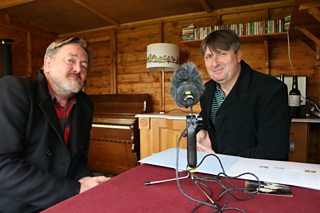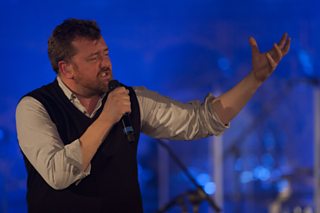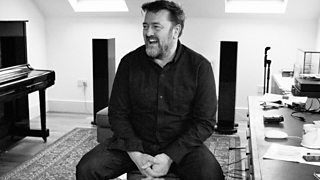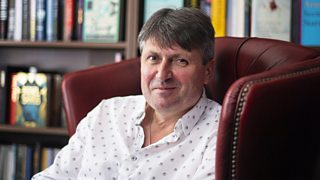Guy Garvey: Nine things we learned when he spoke to Simon Armitage
In a new podcast for Βι¶ΉΤΌΕΔ Radio 4, The Poet Laureate Has Gone To His Shed, Simon Armitage talks to guests about life, language and music. As he translates The Owl and the Nightingale, a long middle English poem in which the two birds debate many things, Simon asks guests to both help him with the poem and to distract him from it.
In the first episode, Simon’s joined in the writing shed at the bottom of his garden by Guy Garvey, the lead singer and lyricist of Elbow, to discuss writers block, Ian McKellan and birdwatching.
Here are 10 things we learned about the musician…

-
![]()
Listen to Episode 1 with Guy Garvey
Simon Armitage talks to Guy Garvey, lead singer of Elbow, fellow birdwatcher and 6 Music presenter.
1. He is one of seven children
Guy has six siblings. The house he grew up in was small, there were lots of kids and his dad Don was a nightshift worker. “When you got up in the morning, everyone had to get ready in silence, because he was not long in bed,” says the musician. “When you got home from school again you had to be quiet until he woke up.”
2. He took his dad’s ashes on a lads’ trip to Ireland
When his dad died, Guy and his siblings all got a small portion of his ashes – but he wasn’t sure what to do with them. When a “jolly” to Ireland with his brothers-in-law was planned, his wife Rachael suggested he scatter his dad’s ashes there. So, he took him, with the intention of scattering him somewhere beautiful. “I had him in my pocket for the whole weekend,” says Guy. “Every beer that I had, with that in the palm of my hand, I was having a beer with Dad.”
3. He gets his singing talent from his mum
“Mum sings and she sings at the top of her voice,” says Guy. She can even sing along to songs she’s never heard: “She just jumps in with a harmony.” When he was 16 or 17, and still living at home, he and Mark Potter (from the band) would work on songs in the kitchen, using a little tape deck that you could record onto. “She loved me and him singing and making up our songs in the kitchen.” She’d offer suggestions for what to include and throw harmonies over the top whilst she was making a cup of tea.

4. Touring the world taught him he needed to write songs that were easy to sing
The singer wasn’t conscious of what notes he could comfortably reach, either in a studio or on stage, until the band made it big. “I never used to consider that and then it only took a couple of world tours for me to start considering it,” he laughs. “If I’m completely honest, I write them in a more comfortable place these days. I used to think the harder it was to sing and the more energy that I had to put into it, the more I meant it and the more authentic it was. And of course that’s not true.”
5. He never worries about losing his voice
In around 2004, he completely lost his voice. And as a gig at the O2 loomed – “which is as big as it gets,” says Guy – he could feel it starting to go again. So, he went to see a renowned vocal coach in Camden. “She looked down my throat and had me sing a few things and then she said, ‘99.999 percent of the time there is nothing wrong with your equipment,’” recalls the singer. The expert explained that if your voice is failing, the chances are you’ve not got the energy to use it. Her advice was invaluable: if you can’t get sleep hydrate, and if you’re worried you’re not going to hit a note breathe a bit deeper and try a bit harder. “I’ve never worried about losing my voice since,” says the lead singer.
6. He’s an occasional birdwatcher
“When I know I’m going to be somewhere beautiful, I’ll take my binoculars with me,” says Guy, “or if I’m going somewhere where I know there’ll be birds I don’t recognise.” In 2008, when Elbow won the Mercury prize, his friend bought him a pair of image stabilising binoculars. When the band started work on the next record, and headed to the Isle of Mull where there are sea eagles, he took them with him. “One way to watch any bird of prey is to lie still in a brightly coloured anorak, because they’ll come and have a look at you,” says Guy. “I lay still in my big red coat for only about 10-minutes and then, clear as day, a sea eagle’s circling, and getting lower and lower, ’til I genuinely had to move for fear,” says Guy. “That was incredible.”

Writer's block is up there with road rage. Give it a name and suddenly it’s an excusable thing.
7. He prefers a phone over a notebook for recording song-writing ideas
“I used to carry a notebook everywhere, and then I lost one in 2003 that I never found,” says the singer. He used to treasure the object, decorate it, and ask other people to write notes in it too – but losing one put him off. “It’s a bit sad but I stopped doing that,” says the songwriter. “These days, on the move, I put things in voicemail on my phone. Or send myself texts.” Recently, however, he’s made a move back to paper: “I decided I needed the cosiness of the notebook again,” says Guy.
8. He doesn’t believe in writer's block
“It’s up there with road rage. Give it a name and suddenly it’s an excusable thing,” says the singer. “Plus, the way I think about writing is, if I sit down and write a load of nonsense, I think ‘I’m glad that’s out the way.’ I think it would have just come out the next time I sat down.” He says the process is like unblocking a pipe so the water can flow. “If you think like that then every time you sit down, regardless of whether or not it’s work you want to share, it’s still work and it’s still useful.”
9. He once turned down Ian McKellan
On Elbow’s song The Birds, there is a reprise sung by an older man. The part very nearly went to one of Britain’s most famous actors. “We actually asked Ian McKellan, and he said yes,” recalls Guy. “He sent us a really funny email that said ‘I would be delighted and honoured – unless of course you decide to use John Hurt like everyone else does.’” However, they decided that a famous voice would be distracting and opted for a man called John instead: ex-clock mender, piano tuner and – they later discovered – an intelligence officer during the war.
More from Simon Armitage and Guy Garvey
-
![]()
Listen to Episode 1 with Guy Garvey
Simon Armitage talks to Guy Garvey, lead singer of Elbow, fellow birdwatcher and 6 Music presenter.
-
![]()
Welcome to The Poet Laureate Has Gone To His Shed
Poet Laureate Simon Armitage invites guests to join him in his garden shed to talk about life, language, art, music and sherry.
-
![]()
Guy Garvey's Finest Hour
Elbow frontman Guy Garvey brings his own unique taste to 6 Music.
-
![]()
Profile: Simon Armitage
Becky Milligan profiles the new poet laureate, Simon Armitage.




